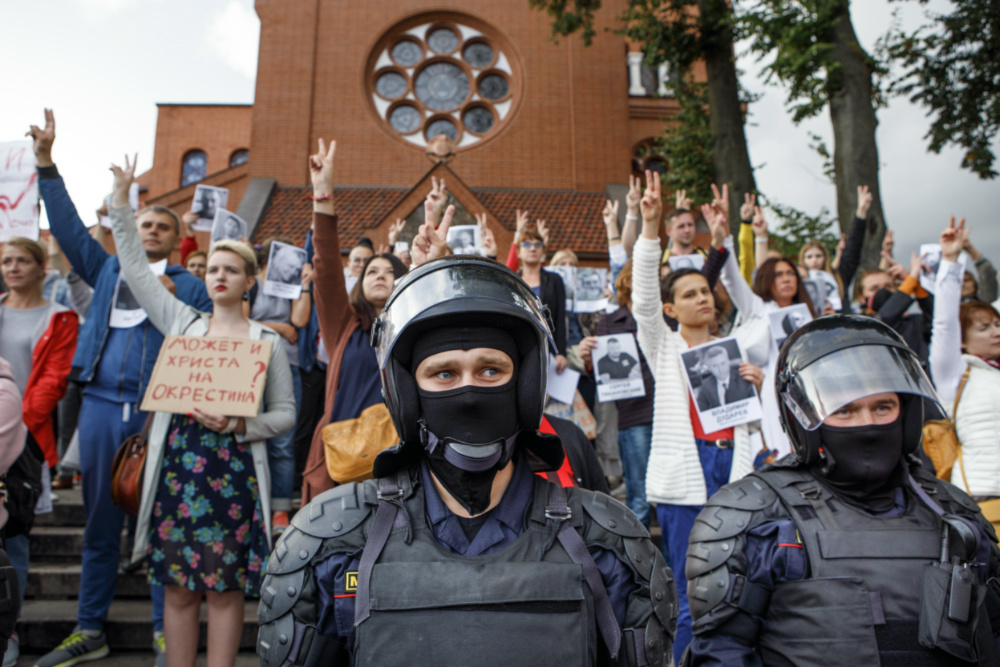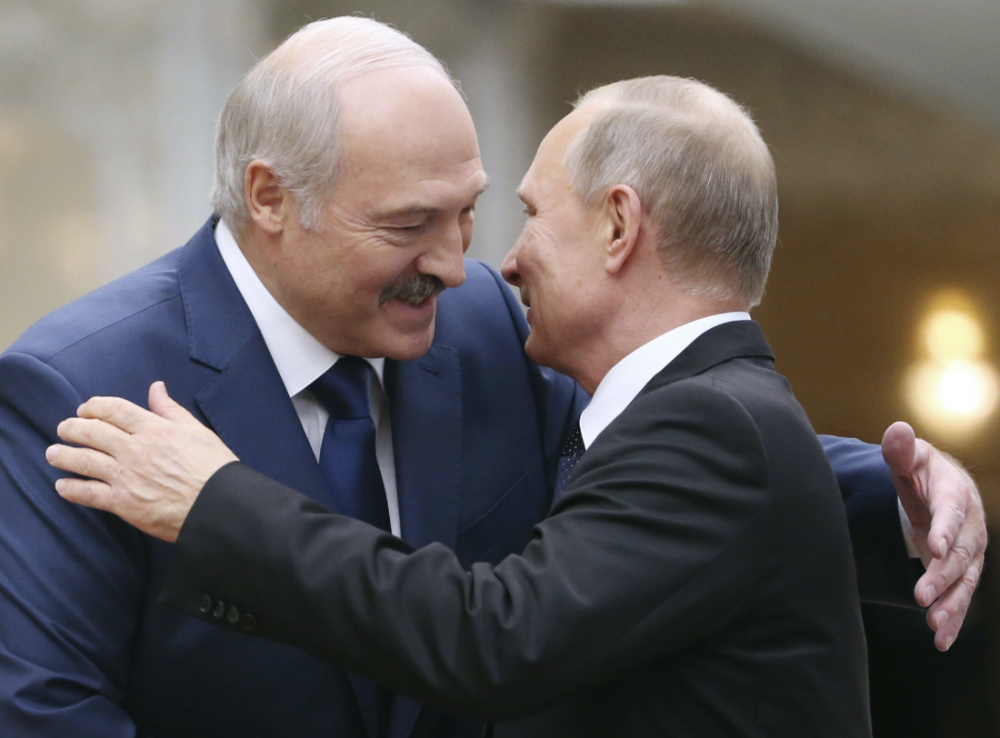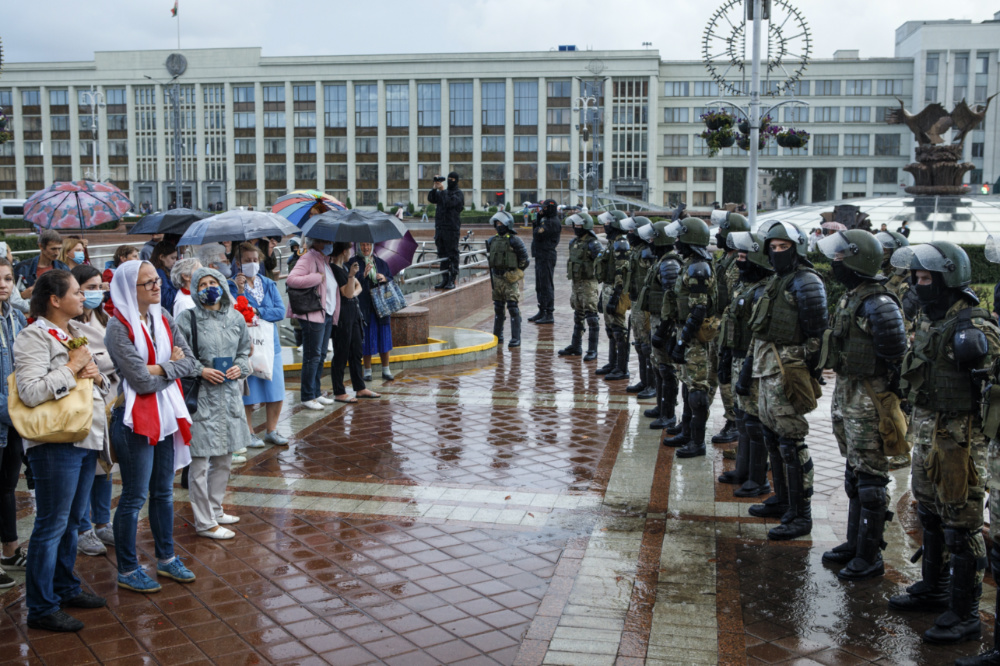Minsk, Belarus/Moscow, Russia
AP
Russian President Vladimir Putin warned that he stands ready to send police to Belarus if protests there turn violent but sees no such need yet, while Belarusian police dispersed a protest in the capital with renewed vigour Thursday, detaining about 180 people and raising pressure on the opposition.
Belarus’ authoritarian president of 26 years, Alexander Lukashenko, has been facing weeks of protests against his re-election to a sixth term in the 9th August vote, which the opposition says was rigged.

Riot police block protesters in front of a Catholic church in Minsk, Belarus, on Thursday, 27th August. Police in Belarus have dispersed protesters who gathered on the capital’s central square, detaining dozens. PICTURE: AP Photo/Dasha Sapranetskaya.
Putin told Russia’s state television Thursday that Lukashenko has asked him to prepare a Russian law enforcement contingent to deploy to Belarus if necessary. Putin said he and Lukashenko have agreed that “there is no such need now, and I hope there won’t be.”
“We have agreed not to use it until the situation starts spinning out of control and extremist elements acting under the cover of political slogans cross certain borders and engage in banditry and start burning cars, houses and banks or take over administrative buildings,” he said.
Hours after Putin’s interview, hundreds of riot police dispersed a protest on the Belarusian capital’s main square in a move that underlined Lukashenko’s determination to squelch protests. Scores of reporters, including AP journalists, were also detained.
The Coordination Council, created by the Belarusian opposition to facilitate a peaceful transition of power, criticised Putin’s statement, saying it’s “inadmissible” for any country to form armed units for use in Belarus.
In an apparent jab at the West, which has condemned Lukashenko’s crackdown on protesters and urged him to launch a dialogue with the opposition, Putin accused unidentified foreign forces of trying to win political advantages from the turmoil in Belarus.
Russia sees neighbouring Belarus as a key bulwark against Western expansion and an important conduit for Russian energy exports. The two countries have a union agreement envisaging close political, economic and military ties, and Lukashenko has relied on cheap Russian energy and other subsidies to keep Belarus’ Soviet-style economy afloat.
Despite the close cooperation, Russia-Belarus relations have often been strained by disputes. Lukashenko has frequently made overtures to the West and accused Moscow of hatching plans to incorporate Belarus.
Just before the election, Belarus arrested 32 private Russian military contractors on charges of planning to stage riots. Belarusian authorities released the men shortly after the vote.
In the interview, Putin described the incident as a provocation by the Ukrainian and the US spy agencies, charging that they lured the Russians to travel to Belarus by promising them jobs in a third country and made Belarusian authorities believe they had a mission to destabilise the country ahead of the vote.
The United States and the European Union have criticised the 9th August election that extended Lukashenko’s rule as neither free nor fair and encouraged Belarusian authorities to engage in a dialogue with the opposition.

In this file photo taken on Thursday, 30th November, 2017, Belarusian President Alexander Lukashenko, left, greets Russian President Vladimir Putin during the Collective Security Council of the Collective Security Treaty Organization summit in Minsk, Belarus. Putin warned that he stands ready to send police to Belarus if protests there turn violent, but added in an interview broadcast Thursday that there is no such need now and voiced hope for stabilizing the situation in the neighbouring country. PICTURE: Tatyana Zenkovich, Pool Photo via AP/File photo.
The Belarusian leader, who has ruled the nation of 9.5 million with an iron fist since 1994, has dismissed the protesters as Western puppets and refused to engage in dialogue with the opposition.
After a brutal crackdown in the first days of post-election protests, when nearly 7,000 people were detained, hundreds were injured and at least three protesters died, the authorities changed tactics and let daily demonstrations go unhindered for nearly two weeks. The government, meanwhile, has maintained pressure on the opposition with threats and selective jailing of its leaders.
On the 19th straight day of protests Thursday, several dozen women stood on the Belarusian capital’s main Independence Square with their hands bound to protest the police dispersal of a rally there the previous night. Amid Wednesday’s crackdown, police blocked the doors of a Catholic church facing the square where several dozen protesters found refuge, causing public outrage and drawing a strong rebuke from the archbishop of Minsk and Mahilyow, Tadeusz Kondrusiewicz.
“Putin must be ashamed, he’s promising to add Russian clubs to the Belarusian ones,” said 45-year-old protester Regina Fustovich.
As the evening came, about 1,000 demonstrators marched across the city to Independence Square, chanting “Freedom!” as motorists honked in support.
“Putin has untied Lukashenko’s hands,” said 20-year-old student, Anton Gavrilovich. “The protest will win sooner or later, because we are the majority, but Belarusians will not forget that.”
Another protester, Irina Furs, a 30-year-old medical worker, suggested that “the Kremlin is afraid that the Belarusians could show an example of a successful peaceful struggle.”
The Viasna rights center said about 180 people, including several Belarusian and foreign journalists, were detained by police on Independence Square.
“The authorities move deliberately to escalate the situation, trying to turn peaceful protests into clashes that would justify the use of force,” Viasna’s Valiantsin Stefanovich told The Associated Press. “We are seeing this escalation and toughening of repressions after the Kremlin’s intervention. It’s important for Lukashenko to show Putin that he controls the situation.”
In the interview, Putin defended the Belarusian authorities’ response to protests, saying that police in Belarus have shown “restraint”.
He accused Western critics of Belarus of hypocrisy and double standards, pointing at examples of violent police action, such as when “they shoot an unarmed man in the back while his three children were sitting in a car” in an apparent reference to the US police shooting of a Black man, Jacob Blake, in Kenosha, Wisconsin, on Sunday.

Riot police block protesters at Independence Square in Minsk, Belarus, on Thursday, 27th August. Police in Belarus have dispersed protesters who gathered on the capital’s central square, detaining dozens. PICTURE: AP Photo/Dasha Sapranetskaya.
As part of a multi-pronged effort to stifle protest, Belarusian prosecutors have opened a criminal probe against the opposition Coordination Council, accusing its members of undermining the country’s security. Belarusian courts this week handed 10 day jail sentences to two council members and summoned several others for questioning, including Svetlana Alexievich, who won the 2015 Nobel Prize in literature.
Another council member, Maria Kolesnikova, a close associate of Lukashenko’s main opposition challenger in the vote, Sviatlana Tsikhanouskaya, was called in for questioning Thursday.
“It’s part of the pressure on civil society,” she told reporters outside Belarus’ Investigative Committee headquarters. “The authorities are refusing to listen to the people.”
The EU ambassadors to Belarus warned Thursday that “prosecution of Coordination Council members on grounds presented by the authorities is unacceptable.”
EU foreign ministers are expected to approve a list of 15 to 20 Belarus officials who would face travel bans in Europe and a freeze on their assets. Lithuania is demanding that 118 people be blacklisted.
– With GEIR MOULSON in Berlin and VANESSA GERA in Warsaw, Poland.






